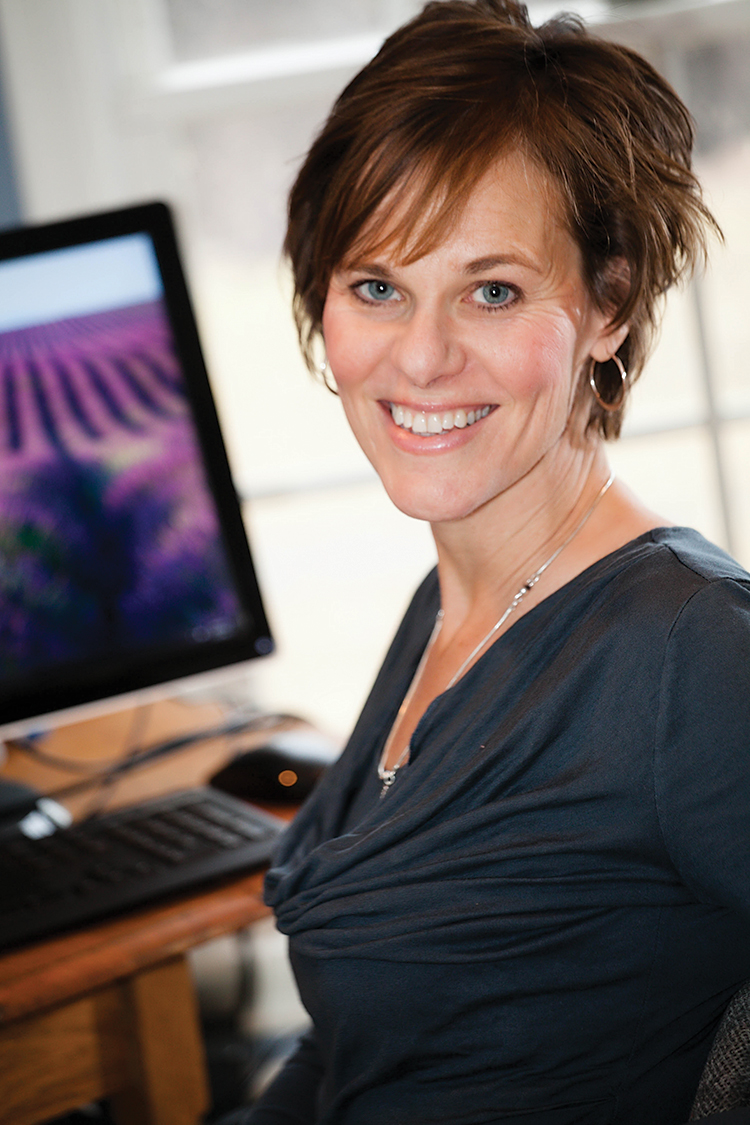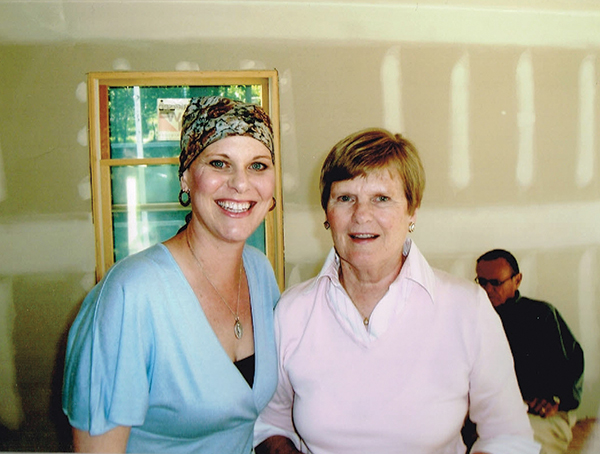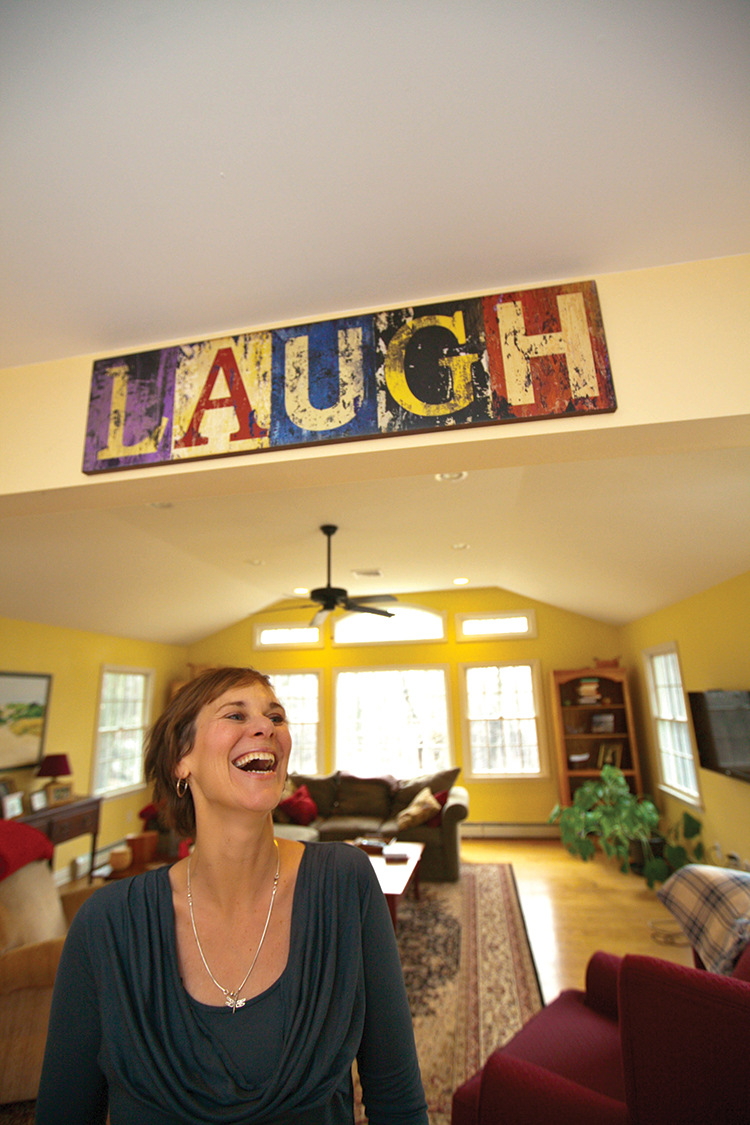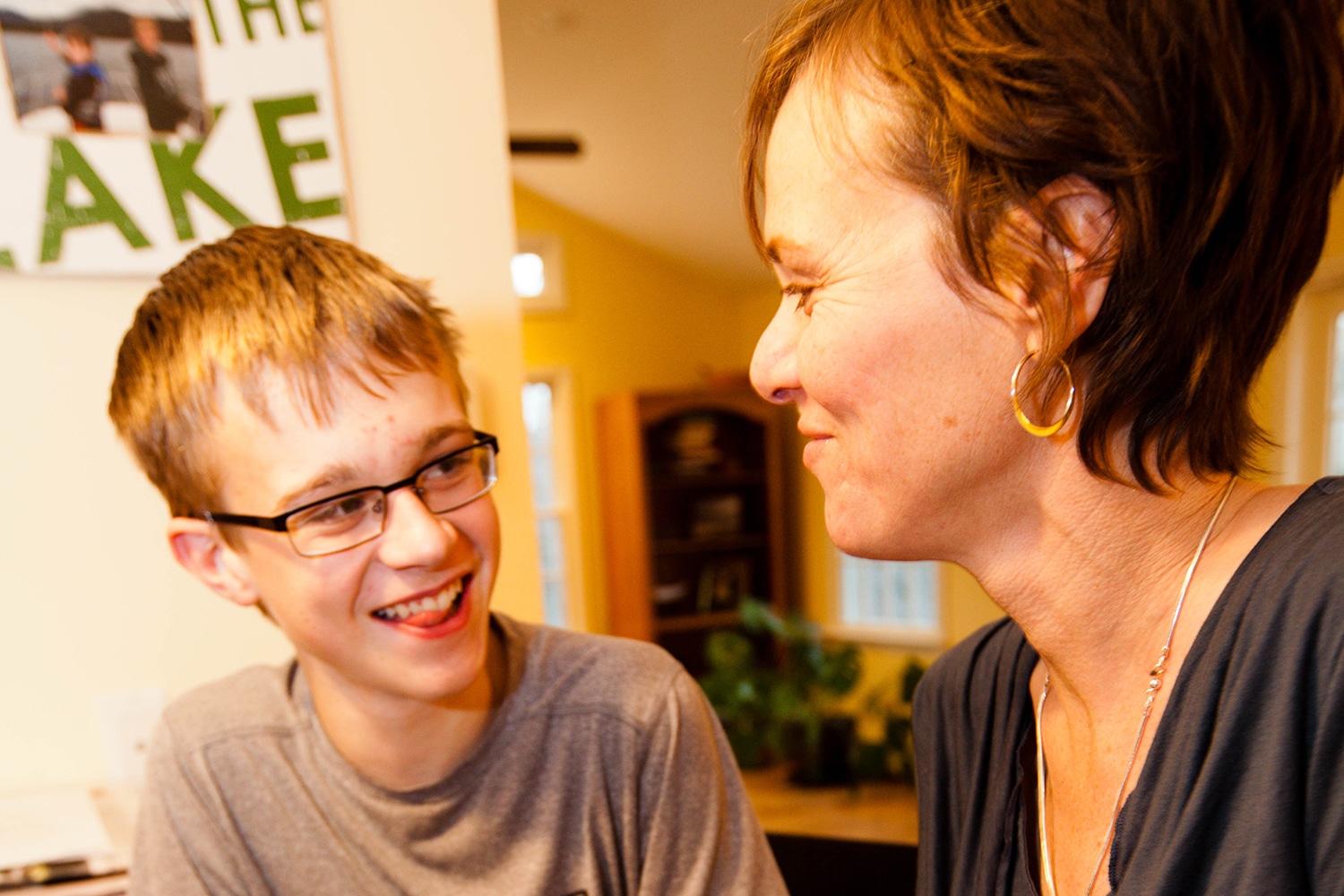WHEN JEN SINGER was diagnosed with aggressive stage III B-cell non-Hodgkin lymphoma in 2007, she wasn’t just concerned about dying. She was worried about how her diagnosis would affect her sons, then ages 8 and 10. How would she tell them she had cancer? How much should she tell them about her treatments? How would it affect their routines? Could she still help them with homework? Take them to swim practice while nauseous from chemo? How would she comfort them when she was terrified herself? What if they acted like nothing was wrong? What would she do if they asked if she might die when she didn’t know the answer herself?
“I went online and Googled ‘parenting with cancer’ and got very little,” says Singer, now 45. Almost all of the results were targeted at parents whose child had cancer, not parents who had cancer.
Helpful resources for moms and dads.
- Jen Singer’s website for parents who have cancer
- When a Parent Has Cancer: A guide to caring for your children, by Wendy S. Harpham
- A web tool for organizing your support network
- Helping Children When a Family Member Has Cancer (from the American Cancer Society)
- When Your Parent Has Cancer: A guide for teens (from the National Cancer Institute)
- Kids Konnected, a program that offers summer camps and support services for kids who have a parent with cancer or who have lost a parent with cancer
- Camp Erin, a network of camps across the U.S. (and one in Canada) for children experiencing bereavement
As someone whose career had revolved largely around parenting advice—Singer created the website mommasaid.net and is the author of the Stop Second-Guessing Yourself parenting book series—the mom of two from Kinnelon, N.J., was floored to find nearly zero online resources for parents like herself. “I felt like there needed to be one place where any parent who was diagnosed with cancer could go and find everything they needed in one online spot,” she says.
Today, Singer is in remission. She takes her kids to sports practices. She coaches one son’s soccer team. She writes about potty training and how to handle toddler tantrums. She helps her sons cope with the still lingering emotional fallout of almost losing their mother. And she’s helping other parents with cancer too.
Parents Speak Up!
In 2011, Singer launched the website www.parentingwithcancer.com, the resource she wished she’d had when she first searched online right after her diagnosis. It serves as a public forum for something people didn’t talk about candidly before. Singer’s website takes parenting with cancer to a new level, one where parents can gain the tools to speak openly to their children about cancer and reach out to others for help, or just share experiences with other parents who’ve been there.
“If you’re a new mom and you’re breastfeeding, you would seek out breastfeeding moms,” says Melissa M. Thompson, an oncology social worker in Batavia, Ill., who runs a private counseling center and works with patients at the Cancer Center at Kishwaukee Community Hospital in DeKalb, Ill. “The power of Jen Singer’s blog is that it builds a social network.”

After she was diagnosed with cancer, mom Jen Singer learned she didn’t have to go it alone. Photo by Doug Sanford
As many cancer survivors know, it wasn’t always this way.
A few decades ago, cancer was not something to be talked about, especially with one’s children. Better treatments and better prognoses for many types of cancer have changed that attitude—for the most part—as have newer parenting styles.
“There was a lot of shame and secrecy around cancer 30 years ago,” says Thompson. “Cancer used to be shameful, similar to AIDS. We couldn’t cure it, so we knew the person would likely die.”
In the 1990s, Wendy S. Harpham, an internal medicine physician in Dallas, found herself in shoes very similar to Singer’s. In 1990, at age 36, she was diagnosed with a type of indolent non-Hodgkin lymphoma—a slow-growing cancer that has no known cure. She struggled to find guidance that might help her navigate her new role as a cancer patient with three young children, then 2, 4 and 6.
“There were a couple of small—I call them tidy—children’s books where the mom gets diagnosed, mom’s bald, mom gets better, everybody’s happy,” says Harpham. “That was not my experience. Treatment was long and difficult. Recovery was not easy, and we didn’t have that happy ending because my cancer kept coming back.”
Harpham, who is now in remission, eventually stopped practicing internal medicine after her second recurrence. Instead, she made educating people about parenting with cancer her priority. In 1997, she published When a Parent Has Cancer: A guide to caring for your children, which she updated in 2004, and she now writes and speaks about how to parent successfully with cancer.

During Jen Singer’s treatment, her mother, Bobbie Perkins (in pink, with Singer), and her father pitched in to keep her sons, Nicholas and Christopher, busy. Photo courtesy of Jen Singer
Although cancer is no longer the secrecy-inducing diagnosis it once was, Harpham says she still routinely encounters patients who are trying to keep their cancer a secret from their families. Singer—who has done more than most parents to bring the topic out in the open—has seen the same thing: Parents who are currently in treatment or who have even completed treatment but have not yet told their children about their diagnosis.
But not telling kids anything, they and other experts say, is a big mistake, even if the parent’s intention is a good one: to protect his or her children.
“It’s very hard to keep a secret like cancer,” says Harpham. “If there’s a conspiracy of silence, children can’t turn to their parents for guidance or help. They may turn to people or ways of coping that are not healthy.”
And talking to your children about your cancer may actually help them grow, by helping them learn to cope with difficult situations. “When you tell children the truth, you are helping children learn to deal with reality in hopeful, healthy ways,” says Harpham. “And isn’t that what parenting is all about?”
What’s more, even if you think you can shield your children from the truth, you probably can’t. Children often know that something is not right, even if you don’t tell them. “Kids sense what’s wrong and fill it in with things that are worse,” says Singer. Her younger son asked her not to tell him when she was having PET scans beforehand. He wanted to know only after she got good news. He was 11 at the time, so she honored his wish. After her last clear scan, she picked him up from school and told him she’d gone for a scan and the result.
His response: “Yeah, I knew something was going on. I knew anyway.”
Helping Kids Cope
For many parents, the question is not whether to tell their children about their cancer, but how to do it. And then, how to help them deal with it.

“Laughter is what gets you and your family through the hell and back that is cancer,” says Jen Singer. Photo by Doug Sanford
The answer depends on the child’s age, individual needs, and preferences, but some rules hold for any child, says Harpham. A parent’s top two strategies, she says, are to “establish and maintain open lines of communication, and always tell the truth couched in love and hopefulness.” Honesty means being upfront even if you don’t know an answer to a question. Tell your child you don’t know, Harpham advises, and that, by a specified deadline, you will find out.
Maintaining a routine can also go a long way toward keeping your child’s life as normal as possible. Thompson recommends identifying the parts of your family routine that can stay the same: activities like family pizza night every Friday. “Children thrive on routine, whether they’re little ones or big ones,” she says.
It’s also essential to recognize that you don’t have to go it alone—and to ask for and accept help. “I let other people take care of us rather than forcing my family to soldier through it silently,” says Singer. “Neighbors took my kids to swim team practice and to their houses for play dates. They spent afternoons eating ice pops, drawing with driveway chalk, and swimming in pools belonging to folks who weren’t family or my closest of friends.”
Many people are timid about asking for help, or find that they’re overwhelmed by the offers and how to organize them, especially in the middle of treatment. Singer suggests trying the free website www.lotsahelpinghands.com. Friends and family can sign up for the site and mark which of your needs they can meet—whether it’s picking your kids up from soccer, driving you to treatment, having the kids over for play dates, or helping arrange that regular Friday pizza night.
Singer didn’t know about the site when she was sick, but she did quickly learn that she had a network of people to lean on—and her children were better off because of it. “Later, my son Nicholas, who was 10 when I was sick, told me that they didn’t feel too overwhelmed while I was in chemo,” she says, “because ‘everyone kept us so busy.’ ”
Age-specific guidelines for children can provide structure to talk about a parent’s cancer diagnosis.
Every child is unique, as will be your method for parenting each one through your cancer. Oncology social worker Melissa M. Thompson notes that a family counselor or social worker should be part of your treatment team. These professionals can help guide you through a time that is a crisis not just for the patient, but the whole family.
Look to these age-specific guidelines to help you formulate ideas for communicating with your child.
Preschoolers
Very young children will “weave fantasy and logic together,” says Thompson. “This is how they create these great play worlds.” This also means that preschoolers think they control the world, which is not necessarily a good thing when a parent has cancer.
“Often, the preschooler will think they somehow caused the cancer,” Thompson says. Parents of preschoolers need to have repeated discussions with their children to explain—and reinforce—that they did not cause the cancer.
“You also want to ask a preschooler what they think about the cancer or what they understand about the cancer,” says Thompson. This way, you can clarify any misconceptions they may have.
Elementary school
Elementary school children are engrossed with learning, which means they might be more interested in the cancer and your treatment than younger or older children. They may also want to accompany you to your treatment sessions, which Thompson says is fine if it’s cleared by your medical team.
While children this age don’t have the same level of magical thinking as preschoolers, they may still feel they played a part in your cancer. Logically, they know they didn’t cause your cancer, but they may still feel that their behavior contributed to the disease, says Thompson. “If they had a fight with you or they’re misbehaving, they’ll feel guilty about the cancer,” says Thompson. “Not that they caused it but that something they did impacted it in some way.”
Teens
“The wonderful thing about teens is that they are so self-absorbed and narcissistic,” Thompson says. “There is a great protection that comes with being a teenager because of their stage of development. The first thing [they may wonder]—besides ‘Can I catch it?’—is how is this going to impact my time with my peers and my activities?”
Talk to your teens about what will remain the same or change in their lives, she says. Include that, “Yes, they will still be going to school,” and how, if at all, your cancer will disrupt their schedules. Stress what will stay the same.
“Remember that teenagers are trying to break away from you anyway. This could push you a little bit further away,” says Thompson. But it’s normal, she says. Even if you were not sick, they would still be trying to form their own identities separate from mom and dad.
Helping Other Parents With Cancer
Since launching in April 2011, Singer’s website has taken off. Two months after it debuted, it was already garnering 10,000 views a month. Today that number has doubled, with new contributions from fellow survivors, writers and social workers, and an organized listing of resources compiled specifically for parents coping with a cancer diagnosis.
Singer eventually plans to expand the site so that “people who are emailing me now have a bigger resource than what it is right now.” In the works: forums and message boards dedicated to the specific concerns of parents who have cancer.
“This is taking it to a level where we can create a community [in which] parents with cancer can talk to each other about what’s going on,” says Thompson. And realize they are not alone.
Cancer Today magazine is free to cancer patients, survivors and caregivers who live in the U.S. Subscribe here to receive four issues per year.





